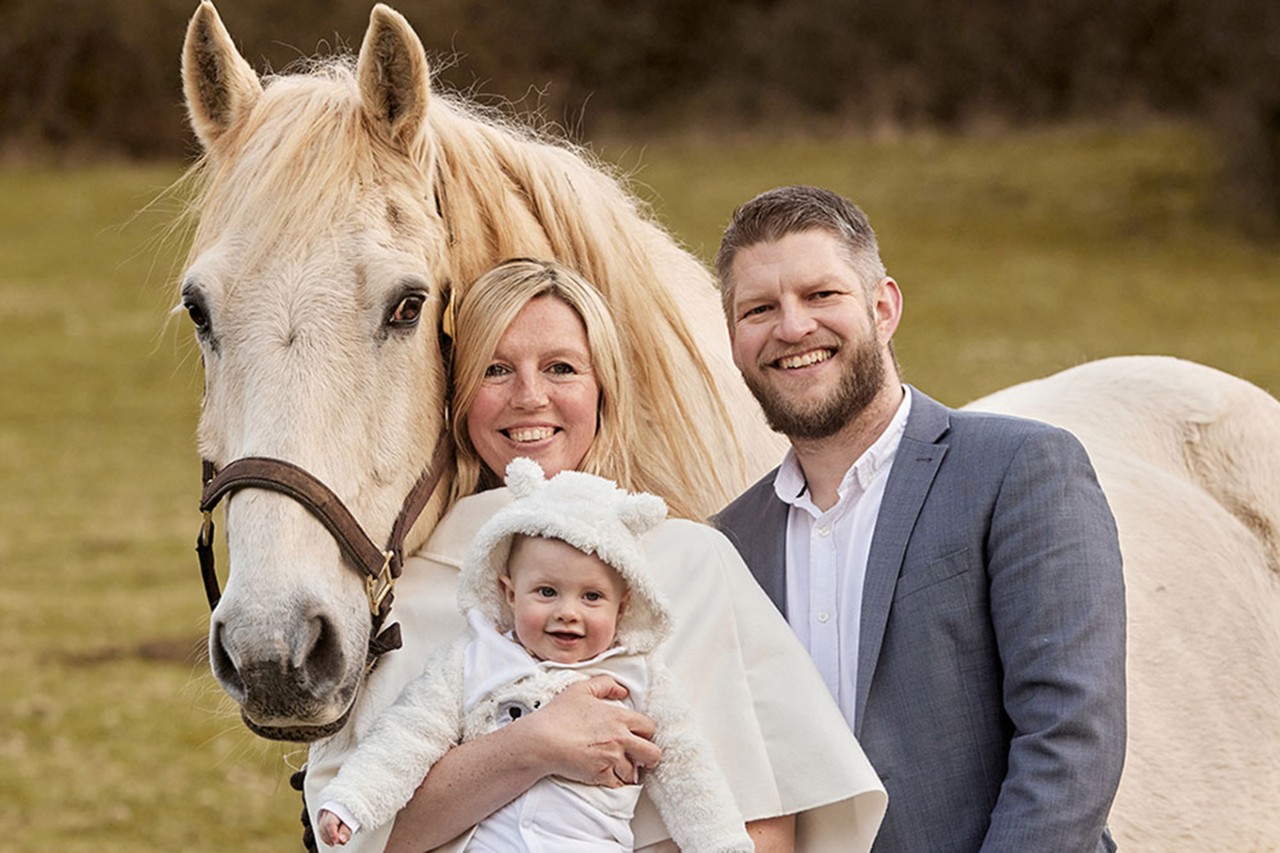
Love can blossom in the most curious of places. For Natalie Forde-Leaves FCCA and her husband James Leaves FCCA, it was in 2003, in the classroom of ‘2.1 Information Systems’.
‘We fell in love studying the ACCA course,’ says Natalie. Needless to say, they both passed the paper with flying colours and, as directorate accountants for Cardiff & Vale NHS trust, were given an office to share. The rest, as they say, is history.
Yet that shared workplace gig could very easily never have happened. ‘In 2003 I was offered a place on KPMG’s graduate scheme,’ Natalie says. ‘They sent me the contract, but as the start-date approached, I thought, I don’t want to go to Manchester or London to be away for weeks on end.’
‘We fell in love studying the ACCA course’
Having her own flat, she admits to feeling ‘settled at a young age’, but there was another factor in her desire to stay in South Wales. ‘I had a horse, which I really didn’t want to leave.’ So she pursued her desire to work in the public sector, taking the NHS role at Cardiff & Vale local health board instead, becoming James’s colleague.
After she completed the ACCA qualification, Natalie took a lecturing position at FTC Kaplan. Then, following a couple of years in financial services, she returned to teaching the ACCA qualification, this time as a senior lecturer at Newport University. Natalie is now a senior lecturer at Cardiff University Business School. She holds an MSc and numerous professional qualifications, and hopes to complete her doctorate soon.
Leaving the band
James’s life took a very different direction. In 2005 he applied for a career break, and left the NHS to play bass guitar full-time with his band Dopamine. Two years later the harsh realities of the music business were becoming clear.
‘We’d just got back from touring Japan and released our second album, but I still wasn’t making any money,’ says James. ‘I was taking on odd jobs for my dad’s telecoms business, but I was inspired by Natalie. I could see how well she was doing.’
Deciding he had to act so he could ‘help with the mortgage’, James reapplied to the NHS. After working for a variety of trusts, he is now assistant director of finance for the Welsh Health Specialised Services Committee.
Recent challenges
The Covid pandemic has presented both the NHS and universities with truly historic challenges. Natalie and James have seen their workplaces challenged as never before, resulting in new ways of working. The radically different has become the new normal in a short timeframe.
‘Now a decision about spending £200m on a new hospital that would normally take years has to be done in a few months’
James’s area of specialised services has been particularly hard hit. ‘We’ve endured a lot,’ he says. ‘The wards filled up with critical care patients, so for people needing specialist treatment such as transplant surgery, the waiting lists have grown.’
Working practices have changed profoundly, he adds. ‘The model we have had in Wales during Covid is the government saying, “Tell us the cost – we’ll fund it”. Normally you’d have a five-stage business case to get a development through. Now a decision about spending £200m on a new hospital that would normally take years has to be done in a few months. It’s not the normal scenario, although at some point there will be a retrospective assessment of the cost and value for money.’
James says that while he is supported by a team of technical accountants, his job is more about soft skills. ‘You could call it relationship management between the commissioners who fund us and the providers we contract. My focus is how to solve financial issues to get projects and investments over the line.’
He says he has noticed that while there are a variety of qualifications across NHS finance functions, a number of ACCA members have stepped up to become the operational managers during the pandemic.
Time-out
The timing of the birth of the couple’s son, Reuben, in August last year, and Natalie’s maternity leave, meant she was fortunate to escape some of the stresses and upheaval caused by the pandemic and focus on her new baby.
‘I did feel guilty knowing all my colleagues were having to deal with the unprecedented challenges, with both staff and students having to find new ways of doing things,’ she says. ‘Before Covid, the case for taking exams online would have taken years, but these ways of working have now become normalised.’
‘You don’t have to be gifted to succeed; it’s more about application and soft skills’
She feels the challenges have been severe, with lecturers and students suffering. ‘Teaching online can be more transmissive and didactic; you can’t really all work around a problem on a whiteboard like you could in a classroom.
‘You also miss the face-to-face interaction. It’s hard teaching to a blank screen, as some students leave their cameras off. Lecturers have been asking, “How can we create a more collaborative workspace?” It’s been very stressful for my colleagues.’
Now Natalie is back teaching at work, she faces both the pandemic and ‘the childcare issues all new mothers have to deal with’.
There have been some positive outcomes resulting from the pandemic, though. James says: ‘There have been massive efficiencies. Zoom means patients can have online appointments, I don’t have to drive to meetings in Lancashire any more, as we just set up Teams. There are huge efficiencies that we can’t yet quantify.’
However, the downside of not being able to ask a simple question across a room is well known to us all. ‘An email trail involving six people could have been a one-minute conversation,’ James says. Training new staff and keeping the teams’ skills up to date has also been difficult.
Love of the job
Natalie describes herself as being ‘from a humble background’, and says many of her students are too. ‘I see myself in many of them. I want them to succeed. I tell them it’s not just about numbers and technical efficiency, because being a professional accountant is a much more rounded experience.’
Nor does she feel that professional accountants have to be highly skilled mathematicians – ‘not in an era of spreadsheets and calculators’, she points out. ‘You don’t have to be gifted to succeed; it’s more about application and soft skills. For me it wasn’t proficiency as much as hard work.’
James thinks she is being modest. ‘She came second in the whole world!’ he says, referring to her winning an ACCA joint silver medal for final exam performance in 2005.
Both recommend a career in accounting. ‘I tell my students that every company has a finance department, so if you’re into sport, or music, or whatever, you can always go into that business from a finance perspective,’ Natalie explains.
Have they ever considered setting up their own business? ‘Who knows – we could maybe set up a tuition centre,’ says Natalie. ‘There’s a business idea there,’ admits James.
Perhaps young Reuben might be persuaded to follow in their footsteps? ‘That’s right – we’re going to get him to take his exams when he’s five,’ says James. ‘Keep it in the family!’


